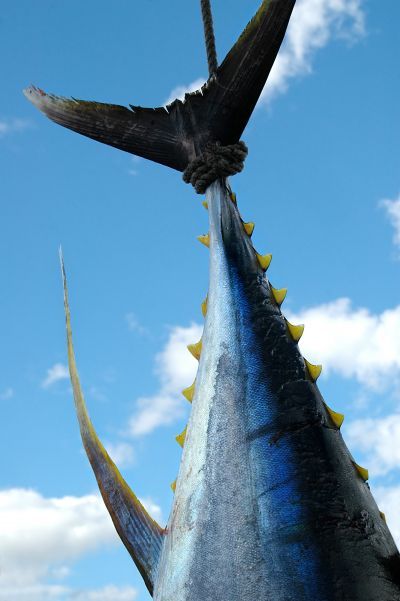CORRECTED: Bluefin tuna quota cut not enough: environmentalists

Environmentalists on Sunday warned bluefin tuna was on its way to extinction after a international meeting of fishery ministry officials trimmed catch quotas but upheld continued hauls of the fish, prized in sushi dishes.
"After meeting for 10 days, the International Commission for the Conservation of Atlantic Tunas (ICCAT) refused to end fishing for Atlantic bluefin tuna," the Pew Environment Group, a US organization that sat on in the meeting in Recife, Brazil, said in a statement.
"Instead, ICCAT set the catch limit for bluefin, considered the most valuable fish in the sea, at 13,500 tons," it said.
That is down from the 19,950-ton quota originally decided for 2010 in an earlier ICCAT meeting in Brussels in April this year.
The Pew Environment Group and other ecological outfits warned that bluefin tuna faced disappearance because of overfishing in the Mediterranean and Atlantic, mainly for lucrative markets in Asia, especially Japan.
Yearly quotas set up by ICCAT are systematically exceeded by industrial fleets. That and illegal fishing have caused the population to decline by more than 85 percent in the eastern Atlantic and by more than 90 percent in the western Atlantic.
Susan Lieberman, the head of international policy for the Pew Environmental Group, told AFP in a telephone interview that while a quota cut was a positive step, it was "too little too late" and was "not enough for even 50 percent chance of recovering the species."
"We were calling for a suspension" of all bluefin tuna catches for at least a year, or, failing that, a quota of "8,000 tons or less," she said.
"What they are doing is responding to economic pressures from the fishing industry. But in the long term there won't be a fishing industry," she said.
Other groups, including Greenpeace, were equally disappointed by Sunday's decision.
Marine biologist Carl Safina, president of the US-based Blue Ocean Institute, said before the Recife meeting that ICCAT was "the poster child for not only failure... but cynicism and a real unwillingness to get serious, be professional and listen to what the science has to say."
Environmental groups are now backing a call from Monaco for the issue of bluefin tuna to be taken before a March meeting of CITES, an international body that sets rules against illegal wildlife trade, with the aim of declaring the fish endangered and putting a ban on catching it.
ICCAT was set up in the late 1960s to conserve "tuna and tuna-like species in the Atlantic Ocean and adjacent seas," according to its website.
Forty-eight countries in every region of the world - ranging from Algeria, Barbados, China and France, to Ivory Coast, Japan, the United States and Venezuela - are contracting parties to ICCAT.
Subscribe to Independent Premium to bookmark this article
Want to bookmark your favourite articles and stories to read or reference later? Start your Independent Premium subscription today.

Join our commenting forum
Join thought-provoking conversations, follow other Independent readers and see their replies